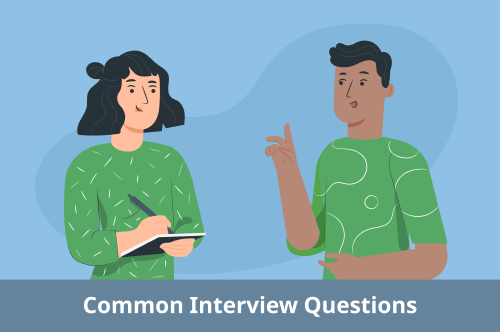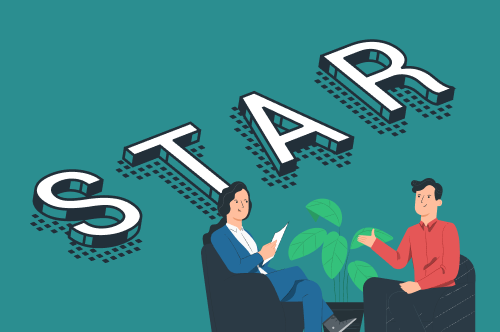It’s good that you’re here researching how to make a fantastic first impression on UK employers by nailing your job interview. A mere 90 seconds into an interview is all it takes for one-third of managers to decide if they’d hire you.
And even if you deliver a solid interview, employers reject more than half of applicants after the first round of the hiring process. So knowing what interviewers expect and how to deliver it is your key to landing a secure, rewarding job in 2024.
To help you prepare, we asked recruitment experts and managers who actually hire people to share their top tips for:
Tips on preparing for your job interview
Feeling nervous before a job interview can be a good sign, indicating that you’re excited about the opportunity and taking the process seriously. But experiencing interview anxiety because you’re not prepared is never good.
Take this advice from experts to ensure that any butterflies in your stomach are fluttering with excitement rather than fear:
1. Know your CV
This may seem like a no-brainer. But don’t forget to go over the CV you submitted before the job interview.
‘Make sure that you’re always prepared to talk about any part of your [CV], from projects to achievements to roles’, offers Derek Bruce, Operations Director at Skills Training Group. ‘If you led a project that enhanced a business’s sales by 20%, be prepared to describe what you did exactly in order to get sales moving’.
And while you’re brushing up on your CV, look through your LinkedIn profile to ensure your information is up to date and you can answer questions about it.
Even if you didn’t send your profile link to your interviewer, chances are they’re among the 93% of hiring managers who use the platform to source and investigate candidates.
2. Do a deep dive into the company
A simple way to impress your interviewer is to do some extra research on their company and bring up your findings.
‘Understand the company’s mission, values, culture, and recent achievements’, advises Vit Koval, Global Hiring & Remote Work Advocate at Globy. ‘Use this knowledge to tailor your responses and demonstrate your enthusiasm for the role. For example, if the company has recently launched a product, mention how that product aligns with your skills or interests during the interview’.
To find this information, you may be tempted to turn to AI tools like ChatGPT that scour the internet and return with easy-to-digest summaries of the details you seek. But Matt Collingwood, Managing Director at VIQU Recruitment, says you should think twice before doing so:
So what can you do to avoid such embarrassment?
Collingwood advises ‘looking on the company’s website and social media for up-to-date information and insights. If a candidate is able to refer to a team event they saw the company share on Instagram or a blog they published on something topical, it shows proactivity and enthusiasm for the company/role’.
3. Prepare engaging stories about your achievements
‘…While you can’t prepare for every curve ball that might be thrown, what you can do is be prepared to answer the things you do know will come up’, suggests Will Hatton, Founder & CEO at Broke Backpacker. ‘…Take the opportunity to consider and plan some of the stories you could share’.
When you prep your stories, try structuring them using the STAR (situation, task, action, result) method to paint a clear picture of what you’ve done. Also, provide hard numbers wherever possible to emphasise the impact of your CV accomplishments.
Examples of hard numbers to highlight include:
- pound amounts you generated or saved
- positive percentage increases and decreases (e.g., ‘I contributed to a 20% increase in customer satisfaction ratings’)
- numbers of people you trained and/or supervised
But what if you don’t have much experience to talk about? Theresa Balsiger, VP of Candidate Relations at Carex Consulting Group, has great advice for you:
‘If there’s an area that you aren’t strong in, be sure to prep for that too. If you’ve never led a team, for example, be prepared to discuss what tools/experiences you’d draw on to ensure you’re prepared to take on that new responsibility’.
4. Practise interviewing with AI
Several of the experts we talked to suggested using AI to practise interviewing.
Per Carter Seuther, CEO of Credit Summit Debt Consolidation, ‘AI can be good tools for brainstorming interview questions and potential answers, or you can just have it pose as the interviewer and do a sort of mock interview that way’.
Some AI platforms you can use to prepare for your interview include:
- ChatGPT (tell it to act as an interviewer in your industry and ask it to critique your answers)
- Wizco (an interview-trained chatbot)
- InterviewFocus (software that evaluates your eye contact, engagement, and more)
While these AI tools are helpful, Seuthe warns against relying too heavily on them:
‘I would prepare as much as it takes to feel confident and self-assured, but not so much that you start to memorise your responses or feel locked into certain answers’.
5. Be ready for a video interview
According to a Jobera report, the trend of video job interviews triggered by COVID-19 is here to stay, as 69% of companies indicated they’d continue conducting remote interviews even after pandemic restrictions were lifted.
Bill Catlette, Managing Partner at Contented Cow Partners, advises that before your video interview you ‘make sure the technology works, that you are familiar with it, and [you are] capturing your best image’.
In addition to testing your equipment, remember to follow in-person interview best practices like:
- maintaining eye contact
- sitting up straight
- dressing appropriately
6. Ensure you know where and when the interview is
‘Make sure that you know the exact details of your interview’, points out Vlad Khorkhorov, CEO & Co-Founder of WebsitePolicies.com.
‘This includes the date, time, place (what floor/department), and the requirements [regarding what] you have to bring… While this may seem basic and a fairly simple task, most people are so excited that they often forget these things and end up cramming on the day itself. Remember, it never hurts to be overprepared’.
If you’re unfamiliar with the building or area, you can even do a test run a few days before the interview to ensure you know where to go. Doing so eliminates unnecessary stress on the big day.
Advice to follow during the interview
Here are tips from HR experts about how you should apply your preparation during the job interview to impress employers and move on to the second round of the hiring process:
7. Dress appropriately
One of the hardest parts of preparing for a job interview is deciding how to dress. But if you get your clothing right, you can separate yourself from other candidates, as 20% of interviewers complain that younger candidates make bad first impressions on them, including by dressing inappropriately.
So how do you decide what to wear?
‘Never assume’, notes Collingwood. ‘Always ask for a dress code from the HR contact or from the recruiter. If they are casual, I would advise still making a little effort’.
Diane Rosen, Career Coach at Compass Consultants, agrees:
8. Bring copies of your CV and cover letter
In this digital age, you may not think bringing copies of your CV and cover letter to an interview is necessary. After all, the interviewer should be able to pull up the files you sent on their device during the interview if needed.
But bringing backup copies is still a good idea.
‘Even if the interviewers are going to have digital copies, bringing your own shows preparation’, says Bruce. ‘In one case, a job seeker offered a copy when the interviewer’s digital device bombed, which showed foresight’.
9. Nail non-verbal interactions
Only 7% of a first impression is based on what you say — the other 93% comes from nonverbals, such as the tone of your voice and your posture.
‘Darting eyes can signal nervousness or untrustworthiness, while maintaining eye contact demonstrates engagement and interest’, says Dr George Sik, a leading psychologist and Director of Assessment at Eras. ‘Avoid common body language mistakes like slouching, fidgeting, and a limp handshake, as these can convey nervousness or lack of confidence’.
To practise getting your body language right, try doing a mock interview with a friend or family member and getting their feedback. Or practise in the mirror or record yourself answering questions on your phone.
10. Show your enthusiasm for the role
‘During the interview, your number one selling point will be enthusiasm’, says Forrest McCall Co-Owner of Mama Needs a Project. ‘You can have all of the skills and knowledge in your niche area that you want, but if you don’t promote that through your excitement then you won’t be inspiring anybody else to feel inspired by you’.
Just remember to be genuine in your enthusiasm. Interviewers will be turned off by someone who’s overenthusiastic.
‘…Even if it’s just using descriptive words, make sure the interviewer can feel your enthusiasm’, continues McCall. ‘The last thing you want is an interviewer thinking “They didn’t seem to want to be here” after you’ve gone’.
11. Ask informed questions
Interviews typically end with an opportunity for you to ask your interviewer questions. Take that opportunity seriously.
‘Ask interesting questions: about the role, your potential team, the company culture, and next steps’, suggests Bruce. ‘This is your opportunity to show that you’re really interested in the insights you can access’.
Examples of good questions you can ask in an interview to show your interest and get information that’ll help you decide whether to accept a job offer include:
- Are there any upcoming projects you’re excited about?
- Can you tell me more about [project or social media post you found in your research]?
- What are the accomplishments you’d expect from me within 30, 60, and/or 90 days?
- How do you feel about your role here?
12. Treat every moment at the company as part of the interview
As soon as you walk through the door, your job interview has started. Anyone you interact with at the company will be getting an idea of what type of coworker you’d be.
‘Be on your best behaviour throughout the entire interview experience, from the [car park] to the receptionist, and everyone with whom you come in contact’, advises Catlette. ‘If you see a piece of [rubbish] lying on the floor, pick it up and dispose of it, on the premise that you may not get a second chance to make a good first impression’.
Tips for after your job interview
When the job interview is over, you’ve still got some work to do, according to the experts:
13. Take time for self-reflection
After the interview, evaluate your performance.
‘Reflect on what went well and areas for improvement’, suggests Koval. Don’t be overly critical of yourself, though.
But do note what you can do better in future interviews — or in interactions with the person you just interviewed with if they offer you a job.
For instance, your reflection may lead you to remember a particular achievement that would’ve been great to talk about or a funny anecdote that would serve you well next time you need to answer the typical opening interview question, ‘tell me about yourself’.
14. Send an engaging thank-you message
‘Sending a thank-you email within 24 hours is not just courteous — it’s an opportunity to reiterate your interest and summarise why you’re the ideal candidate’, offers Adam Jacob, CEO and Managing Director at Hunter Talent. ‘… My experience at Hunter Talent has shown that candidates who follow up effectively often leave a lasting impression, demonstrating their enthusiasm and professionalism’.
When you write an interview follow-up email, it’s important to make it engaging.
‘Try to make it personalised as much as possible’, says Belsiger. ‘If there was something you discussed that may help them remember you, be sure to reference it!’
Write a bang-up thank-you note, and it just might secure you a job offer:
15. Check in again (if necessary)
If you don’t hear back from the employer regarding their decision within a few weeks (UK employers take 27.5 days on average to fill a role, so give them some time), check in to see where you stand.
One check-in should be enough. According to Bruce:
‘… it’s fine to send a gentle follow-up email asking about where things stand. Persistent follow-ups, however, might signal a lack of tact. For example, a note reaffirming your interest and asking if there were any new developments sends the point with poise.
More interview-prepping resources
Here are some more expert tips to help you get ready for your interview:
- The most common interview questions and answers
- How to answer ‘What motivates you?’
- Preparing your Civil Service Success Profiles
- How to answer ‘What are your greatest strengths and weaknesses?’
- How to answer ‘What are your salary expectations?’
- How to answer ‘Why do you want to work for us?’
About CV Genius
CV Genius is the go-to resource for UK job seekers of all industries and experience levels.
With an intuitive CV maker, a diverse collection of free industry-specific resources like cover letter examples and CV templates, as well as guides on how to write a perfect CV and cover letter. CV Genius has been featured in multiple renowned publications, such as the BBC, HR.com, MSN, Forbes, and Glassdoor.
CV Genius and its team of career advisors and HR specialists can help anyone make an effective job application and earn more interviews.
For media queries or concerns, please contact us.




